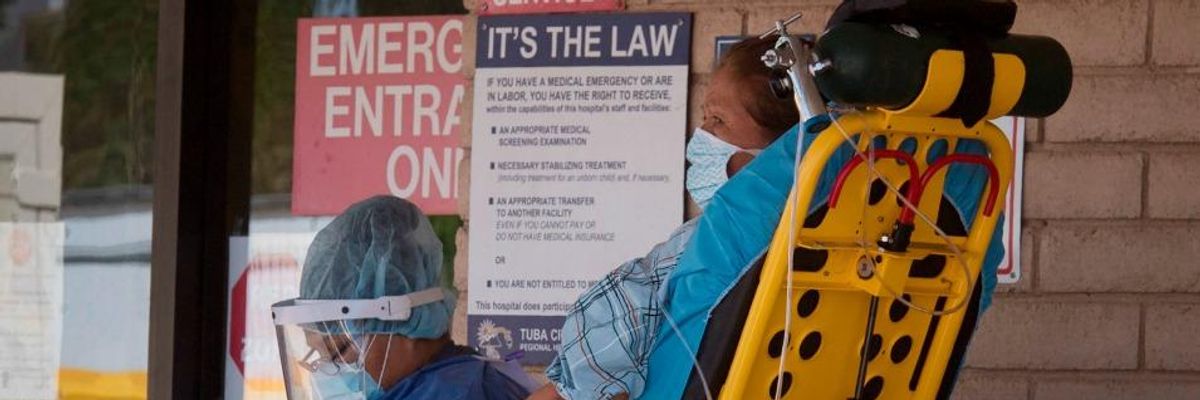Following weeks of warnings from public health experts regarding the dangers of allowing the public into bars, restaurants, and other enclosed spaces while coronavirus case numbers continue to rise in several states, hospitals in two of the hardest-hit states showed signs that the pandemic has spun out of control in the United States' current epicenters.
According to Florida's Agency for Health Care Administration, 85% of the state's intensive care unit (ICU) beds were full as of Saturday morning. Fewer than 1,000 beds are currently available for patients who become critically ill with Covid-19 in a state where more than 11,000 new cases were reported on Friday. More than 9,000 new cases and 421 new hospitalizations were reported on Saturday.
"We will have hospitals overwhelmed and not only in terms of ICU beds and hospitals--and that's bad--but exhausted hospital staff and hospital staff that [are] getting ill themselves. So, we won't have enough manpower, human power, to manage all of this."
--Dr. Peter Hotez, Baylor College of Medicine
Across the country, in Arizona, 90% of ICU beds were reported to be full according to The Guardian.
Dr. Peter Hotez, dean of tropical medicine at Baylor College of Medicine, told CNN Friday evening that like healthcare workers did in New York City in April as hospitals rapidly became overrun with coronavirus patients, doctors and nurses in Arizona, Florida, and other states where cases are skyrocketing may soon become overwhelmed by the demand.
"We will have hospitals overwhelmed and not only in terms of ICU beds and hospitals--and that's bad--but exhausted hospital staff and hospital staff that [are] getting ill themselves," Hotez said. "So, we won't have enough manpower, human power, to manage all of this."
In Florida, at least 52 hospitals are currently at full capacity in their ICU's, but Gov. Ron DeSantis, a loyalist to President Donald Trump who began pushing to reopen the state's economy in early May, downplayed the situation.
"There'll be articles saying, 'Oh, my gosh. They're at 90 percent,'" DeSantis said at a press conference Friday. "Well, that's how hospitals normally run."
As tens of thousands of people in Florida became ill over the past two days, the state reopened Walt Disney World, one of its top tourist attractions, while DeSantis stressed the importance of schools reopening in the fall.
DeSantis was forced on June 26 to direct bars to shut down again as case numbers skyrocketed, nearly two months after he began the process of reopening. But grim new statistics across the state indicated that the effects of the early reopening are coming to light now.
Florida was among several states which recently saw significant increases in their seven-day averages for coronavirus deaths, according to Johns Hopkins University.
"It's consistently picking up. And it's picking up at the time you'd expect it to," William Hanage, a Harvard University infectious diseases researcher, told The Guardian Saturday of the nationwide death toll, whose increases are currently being driven mainly by California, Texas, Florida, Arizona, South Carolina, Illinois, and New Jersey.
In Arizona on Friday evening, some morgues reported that they were near capacity, with Maricopa Office of the Medical Examiner saying it was 97% full.
Phoenix Mayor Kate Gallego, a Democrat, criticized Republican Gov. Doug Ducey's decision to begin reopening the state in mid-May.
"We opened way too early in Arizona. We were one of the last states to go to stay at home and one of the first to reemerge, and we reemerged at zero to 60," Gallego told ABC News. "We had crowded nightclubs handing out free champagne, no masks. Our 20- to 44-year-olds, which is my own demographic, really led the explosion, and we've seen such growth in that area."
Like DeSantis, Ducey was forced in late June to pause the reopenings of some establishments, including bars, gyms, and movie theaters.
The state reported more than 3,000 new cases on Saturday, but as of Saturday afternoon Ducey had not announced any new reopening policy changes.




